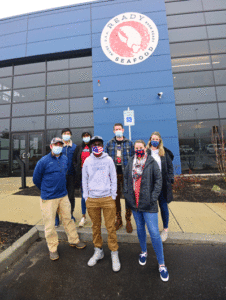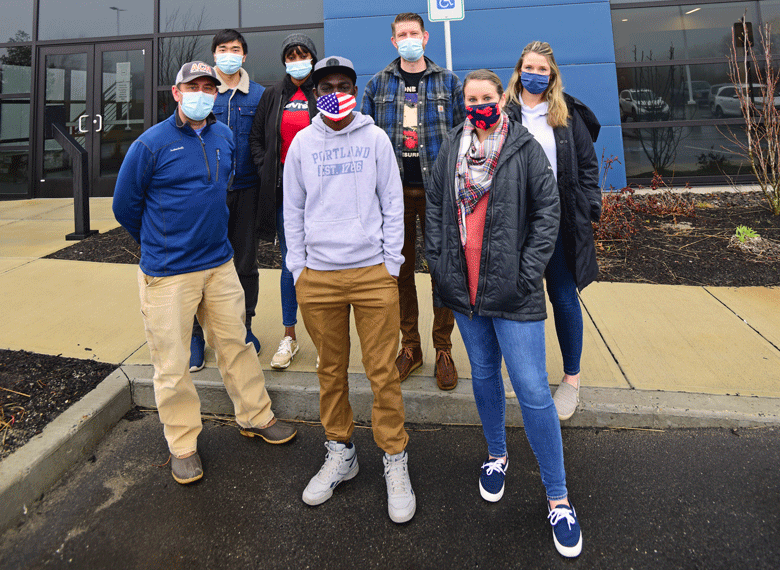Welcoming immigrants to Maine is more than just the polite, hospitable thing to do. It’s critical to the state’s economic future.
That’s the view of the authors of Maine’s community development strategy for 2020-2029, who assert that the state will lose 65,000 workers to retirement by 2029 and that to remain economically viable, some 75,000 new workers must be added.
“The longer the state doesn’t take affirmative steps to try to attract more people from other states and other countries, the more dire our workforce shortage is becoming,” said Beth Stickney, who has worked as an immigration lawyer for 35 years and founded the Immigrant Legal Advocacy Project and the Maine Business Immigration Coalition.
“This is what our new workforce looks like. It’s new Mainers.”
The need will be especially felt in the industrial sector, which includes seafood processing.
“When you think of a traditional working waterfront, people have an image of that in mind,” said Curt Brown, a marine biologist at Ready Seafood in Saco, where more than half of its 400 employees are “new” Mainers who primarily hail from the Congo, Angola, Vietnam, and Cambodia.
“We are an integral part of the working waterfront because we get sustainable, traceable lobster from the coast of Maine to points all around the world,” Brown said. “That doesn’t happen without new Mainers, here and throughout Maine’s marine economy. It’s such a huge part of the working waterfront story that doesn’t get told.”
That view was echoed by Charlie Gauvin, employment case manager in refugee and immigration services at Catholic Charities Maine, who has seen an increase in demand for workers he believes could not be met without immigrants.
“New Mainers are breathing some life back into Maine’s industrial economy,” he said. “It’s calling back to Maine’s industrial past, to more of what it looked like once upon a time. They’re making a redevelopment and revitalization of Maine’s industrial economies possible.”

New Mainers have joined Maine’s economy in recent years in virtually every sector across the state: forestry, seafood harvesting and processing, farming, construction, manufacturing, eldercare, healthcare, hospitality, and tourism. Former migrant farm workers in the blueberry industry have transformed the town of Milbridge into a thriving year-round multicultural community, and a Somali population has been credited with revitalizing downtown Lewiston over the past 20 years.
Ready Seafood began employing new Mainers in high numbers four years ago, at which point cohorts based on native languages and a step-up program designed to promote from within were implemented.
“People are still thinking that they’re filling a gap in their operations, rather than looking at new Mainers as the workforce,” said Brian Skoczenski, chief operations officer at Ready Seafood. “This is our new workforce. This is what our new workforce looks like. It’s new Mainers.”
And Ready Seafood is looking beyond entry level jobs.
“Our employees are seeing that there’s a pipeline for growth,” said Skoczenski. “We want everyone coming in thinking they’re going to be the CEO of the company.”
Ben Conniff, co-founder and chief innovation officer at Luke’s Lobster, says a majority of the company’s employees come from Cambodia, the Congo, Angola, and El Salvador.
“New Mainers are a lifeblood in this industry. They have been for a long time, and they always will be,” he said. Luke’s Lobster recently started an in-house English language training program so that more new Mainer employees can be promoted to supervisory positions. “The kind of energy in those folks is what the state really needs to grow,” Conniff said.
And that energy often translates into personal growth.
“I started seeing change in the company and change in myself, as well,” said Francisco Bumba, a 29-year-old petroleum engineer from Angola who started at Ready Seafood as a lobster cracker and has been promoted five times in less than three years. He now works in the HR department and is responsible for hiring and training.
Moise Munamba, a 27-year-old electrical engineering student from the Congo and a maintenance technician at Ready Seafood, sees the impact he and others are having.
“If you work at Ready Seafood, you’re part of the change that this company is bringing to the state of Maine,” he said. “One of the pieces that makes this company strong is that it draws its power from different people and different communities, who bring their different mindsets, different energy, and different points of view.”
Ready’s COO Skoczenski believes his company is showing others the way to success.
“We have an opportunity in the state of Maine to be one of the leaders in international workforce development,” he said, “and the more that we understand that this is our new workforce, that these are new ideas, that these are highly educated people, the more we are going to succeed.”
It’s not all about the work. The multicultural nature of the new Mainer workforce manifests itself in the five senses, as well.
“When I go into the facility in Portland at 9 a.m., everyone is jamming out to Congolese music. Guys coming out of the prison system, guys who have been in Portland their whole lives—everyone,” said Skoczenski, who also said that a Vietnamese woman sets up a food cart at the Saco facility in the summertime, with a daily line of 40 people from all backgrounds. “Five years ago, I couldn’t have imagined that in the seafood industry.”
Stickney, the immigration lawyer, sees new Mainers as part of the American fabric.
“Just like the people who came through Ellis Island, these people have something,” she said. “They have the guts to get on the boat, the plane, to go by foot, whatever they have to do, to leave everything familiar behind and start something new.”





